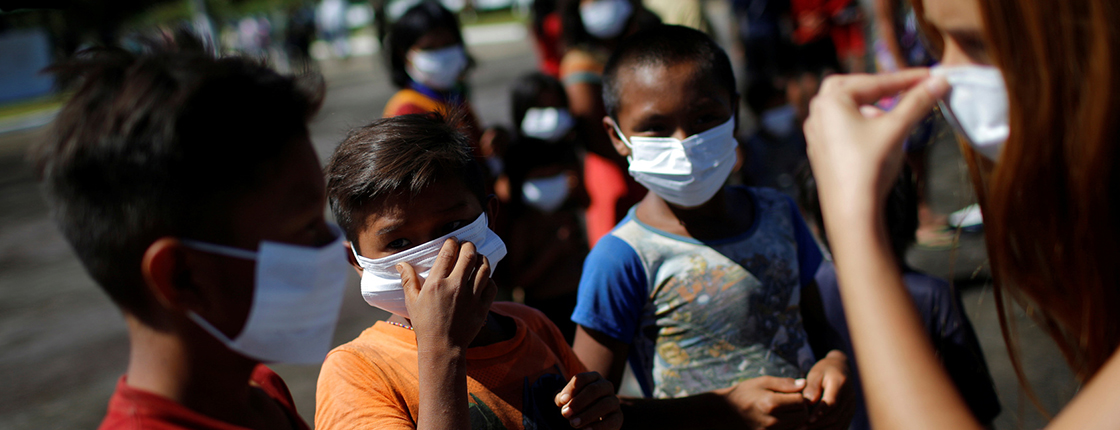


COVID-19 has claimed the lives of more than two million people, with more than 100 million cases worldwide, as of early 2021. Among the many ripple effects of the pandemic, the massive disruption to lives and livelihoods has left some countries and communities vulnerable to triggers that could lead to large-scale violence. As pandemic responses continue to evolve in every corner of the world, some responses might be increasing risks for mass violence and atrocities, while others might be mitigating them.
As an organization focused on the upstream prevention of mass violence and atrocities, the Stanley Center for Peace and Security is interested in how the pandemic—and responses to it—impact the factors for atrocity risks or resilience. Exploring this question is Red Flags or Resilience? COVID-19’s Impact on Atrocity Risks, a multimedia commissioning project that applies two lenses of analysis: the UN Framework of Analysis for Atrocity Crimes and Alex Bellamy of the University of Queensland, Australia’s five factors for strengthening resilience.
Efforts to identify the potential implications of COVID-19 for atrocity prevention have been primarily focused on engaging national governments and advocacy organizations. Red Flags or Resilience complements that commentary by engaging journalistic perspectives—including reporting on real-world developments in a variety of geographical and political contexts—to examine the ways in which factors for risk and resilience are manifesting across different levels and sectors of society.
Annie Hylton explores the connections between gender-based violence and risks for atrocity crimes in the context of COVID-19 in Poland. Her written work is complemented by Maciek Nabrdalik’s photography.
Tatira Zwinoira investigates how COVID-19 lockdown measures in Zimbabwe may have been used to commit atrocity crimes against women. Zwinoira’s reporting incorporates interviews with women affected by the violence, members of local civil society organizations, and individuals in Zimbabwe’s government, army, and police forces, and features photography by Tafadzwa Ufumeli.
Jayaprakash Tissainayagam explores ways in which Sri Lanka’s pandemic response has exacerbated the vulnerabilities of minority groups, including the Tamil people and Muslim population. His work emphasizes the use of civil society networks to build resilience.
Natalia Messer reports on the experiences of Indigenous and Afro-Colombian peoples who have faced increased violence throughout the Colombian government’s response to COVID-19.
Adnan Bhat uncovers views from the ground in the disputed region of Kashmir as he examines the impacts of restrictive laws imposed by the government of India during its COVID response. Videography from Syed Shahriyar complements the written piece.
Caroline Tracey examines COVID-19’s contributions to increased violence against women in Mexico using the UN Framework for Atrocity Crimes and Bellamy’s five factors for strengthening resilience to better understand civil society’s response.
Braema Mathiaparanam analyzes how risks and rights violations have increased for undocumented people in Malaysia during the pandemic. Her analysis complements the journalism stories of the project and offers policy recommendations for bolstering the resilience of vulnerable populations.
Each story in this multimedia project utilized the following analytical frameworks to shed light on the connections between COVID-19 and the factors for risk and resilience to mass violence in different societal contexts.
The United Nations Office on Genocide Prevention and on the Responsibility to Protect developed the Framework as a risk analysis and assessment tool for the three legally defined atrocity crimes: genocide, crimes against humanity, and war crimes. Atrocity crimes can encompass large-scale violence and significant loss of human life, but these events rarely occur at random. Mass violence is a process; at each stage there are efforts that can be taken to prevent or mitigate further destruction. The Framework is an analysis tool for assessing the threat of violence across the globe, providing 14 risk factors that increase a society’s susceptibility to violence, and indicators, which explore different manifestations of each factor. By studying these risk factors and indicators, it is possible to identify and address early warning signs before atrocity crimes occur.
Research shows that societies can mitigate the risks identified in the Framework of Analysis by focusing on the structural prevention of mass violence and atrocities. These structural, or upstream, approaches address the systemic factors that can either lead to violence or bolster peace. In his work, Reducing Risk, Strengthening Resilience: Toward the Structural Prevention of Atrocity Crimes, Alex Bellamy identifies five areas where states and societies can support structural prevention: constructive management of diversity; legitimate and capable authority; security of livelihoods; vibrant civil society and active private sectors; and guarantees of nonrecurrence. Although states hold the primary responsibility for structural prevention, external actors, including international, regional, and local organizations, can uphold local sources of resilience.
By applying a journalistic lens through rich reporting, photography, and voices from the ground as well as specific frameworks for analysis to examine COVID-19’s implications for peace, this multimedia project seeks to spark conversations and contribute to a shared understanding of what atrocity risks and resilience look like in a pandemic. When decisionmakers understand how factors for risk and resilience can manifest across a variety of geographical and political contexts, they are better equipped to promote COVID-19 response and recovery efforts that can build more peaceful societies.
 The Stanley Center is partnering with Mark Leon Goldberg, host of the Global Dispatches Podcast, to produce interviews with select authors from the Red Flags or Resilience series. These episodes will be available here as they are released, and via the platforms that currently host Global Dispatches including Spotify, Apple Podcasts, and Google Podcasts.
The Stanley Center is partnering with Mark Leon Goldberg, host of the Global Dispatches Podcast, to produce interviews with select authors from the Red Flags or Resilience series. These episodes will be available here as they are released, and via the platforms that currently host Global Dispatches including Spotify, Apple Podcasts, and Google Podcasts.
Podcast episodes:

Our programs for journalists, editors, and other media producers enable rigorous and independent reporting on issues related to global peace and security. Click to learn more about Stanley Center Journalism and Media Programs.
Learn MoreUpcoming opportunities and important takeaways from our collaborations are often published on our website to inform work by policymakers, nonprofits, journalists, representatives from the private sector, and other actors. Subscribe to receive these updates direct to your inbox.
Subscribe